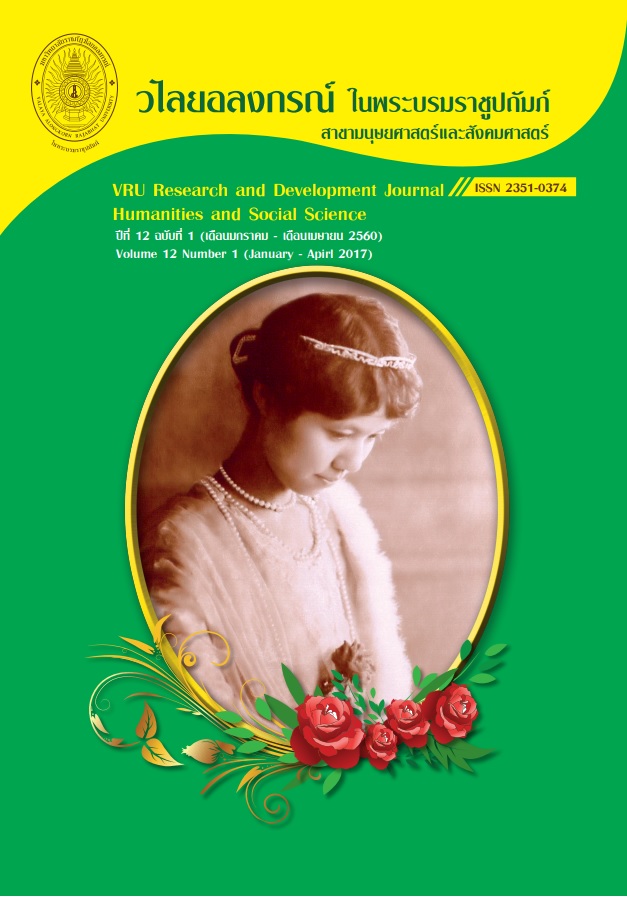การศึกษาสร้างตัวแบบสภาพลเมืองจังหวัดปทุมธานีสู่ความเข้มแข็งประชาธิปไตยไทย
Main Article Content
Abstract
งานวิจัยครั้งนี้ได้รับทุนสนับสนุนจากกองทุนพัฒนาการเมือง สถาบันพระปกเกล้า โดยมีวัตถุประสงค์การวิจัยครั้งนี้ 1. เพื่อศึกษาสภาพปัญหา และรับฟังความคิดเห็นของภาคประชาชนที่ส่งผลต่อการพัฒนาการเมืองภาคพลเมืองให้นำไปสู่การสร้างสภาพลเมืองจังหวัดปทุมธานี 2. เพื่อศึกษากระบวนการเรียนรู้และการมีส่วนร่วมทาง การเมืองของภาคพลเมือง รวมทั้งองค์กรปกครองส่วนท้องถิ่นให้มีความเชื่อมโยงและสร้างรากฐานประชาธิปไตยให้เข้มแข็งและยั่งยืน และ 3. เพื่อสร้างตัวแบบสภาพลเมืองของจังหวัดปทุมธานีและนำไปสู่ความเข้มแข็งของประชาธิปไตยไทย
กลุ่มตัวอย่างได้แก่ ผู้นำชุมชน ผู้บริหารท้องถิ่น ตัวแทนสภาองค์กรชุมชน อำเภอละ 3 คน รวมทั้งสิ้น 7 อำเภอ จำนวน 21 คน การเปิดเวทีประชาคม (Focus Groups ) จากตัวแทนประชาชน ผู้นำชุมชน องค์กรปกครองส่วนท้องถิ่น เจ้าหน้าที่รัฐ โดยครั้งที่ 1 มาจาก 7 อำเภอ อำเภอละ 120 คน รวมทั้งสิ้น 840 คน และในครั้งที่ 2 ตัวแทนอำเภอละ 20 คน ทั้งหมด 7 อำเภอ รวมทั้งสิ้น 140 คน ดังนั้น กลุ่มตัวอย่างจากการจัดเวทีประชาคม จำนวน 2 ครั้ง ทั้งหมดรวม 980 คน เครื่องมือที่ใช้ในการวิจัยครั้งนี้เป็นการสัมภาษณ์เชิงลึก (In-depth interview) ข้อมูลเกี่ยวกับปรากฏการณ์การเมือง วัฒนธรรมทางการเมือง การเรียนรู้และการกล่อมเกลาทางการเมืองในจังหวัดปทุมธานี โดยการสัมภาษณ์เชิงลึกกับผู้ที่มีความรู้ความเข้าใจ และรวมทั้งเป็นผู้รู้เกี่ยวกับการเมืองภาคพลเมือง และแบบสอบถามความคิดของประชาชนที่มีต่อรูปแบบสภาพลเมืองจังหวัดปทุมธานีจากกลุ่มตัวอย่างประชาชนในจังหวัดปทุมธานี จำนวน 500 คน สำหรับสถิติที่ใช้ในการวิเคราะห์ข้อมูล ใช้ค่าร้อยละ ค่าเฉลี่ย เปรียบเทียบความคิดเห็นจำแนกตามรูปแบบลักษณะของสภาพลเมือง
ผลการวิจัยพบว่า
- สภาพปัญหา และรับฟังความคิดเห็นของภาคประชาชนที่ส่งผลต่อการพัฒนาการเมืองภาคพลเมืองให้นำไปสู่การสร้างสภาพลเมืองจังหวัดปทุมธานีพบว่า จังหวัดปทุมธานีมีลักษณะสภาพสังคมเป็นแบบสังคมกึ่งเมืองและกึ่งชนบท ที่มีลักษณะพิเศษเป็น 3 นาครา ประกอบไปด้วย ลักษณะความเป็นเขตเมือง เขตพื้นที่เกษตรกรรม และเขตอุตสาหกรรม ดังนั้นจึงมีความหลากหลายทางสังคมสูงและเป็นปัจจัยสำคัญต่อการพัฒนาการเมืองภาคพลเมือง เช่น ในเขตพื้นที่เมืองมักจะขาดการมีส่วนร่วมทางการเมืองในชุมชนและท้องถิ่นของตนเอง เขตพื้นที่การเกษตรกรรม ชุมชนมีการส่วนร่วมสูงกว่าสังคมเมือง แต่ในพื้นที่เขตอุตสาหกรรมเป็นประชากรแฝงเข้ามาทำงานในพื้นที่จังหวัดปทุมธานีจำนวนมากจึงไม่ค่อยสนใจต่อการเมืองภาคพลเมือง นอกจากนี้ยังมีปัญหาการเมืองท้องถิ่นมีการแข่งขันกันสูงนำไปสู่ปัญหาของการซื้อเสียง นอกจากนั้นยังมีปัจจัยอื่นๆที่ส่งผลต่อการพัฒนาการเมืองภาคประชาชน เช่นปัญหาความยากจน ปัญหาขาดที่ดินทำกิน และที่อยู่อาศัย ในบางพื้นที่ไม่สามารถขับเคลื่อนการเมืองภาคพลเมืองได้ โดยเฉพาะไม่สามารถจัดตั้งสภาองค์กรชุมชน
- ผลการศึกษากระบวนการเรียนรู้และการมีส่วนร่วมทางการเมืองของภาคพลเมือง รวมทั้งองค์กรปกครองส่วนท้องถิ่นให้มีความเชื่อมโยงและสร้างรากฐานประชาธิปไตยให้เข้มแข็งและยั่งยืน พบว่า มีแกนนำชุมชนและกลุ่มคนที่ตื่นตัวทางการเมืองมาการรวมตัวและขับเคลื่อนการเมืองภาคพลเมืองของจังหวัดปทุมธานีมากขึ้นทั้งในการจัดตั้งสภาองค์กรชุมชนจำนวน 51 ตำบล จากทั้งหมด 64 ตำบล ในส่วนที่ยังไม่มีการจัดตั้ง จะรวมอยู่ในรูปของการ “ขบวนจังหวัดจัดการตนเองจังหวัดปทุมธานี” เกิดคณะกรรมการเครือข่ายภาคประชาสังคมจังหวัดปทุมธานี (คปจ.) ศูนย์พัฒนาการเมืองภาคพลเมือง สถาบันพระปกเกล้า จังหวัดปทุมธานี ศูนย์ประสานงานภาคพลเมือง สภาพัฒนาการเมือง จังหวัดปทุมธานี โรงเรียนพลเมืองจังหวัดปทุมธานี เพื่อสร้างความเข้มแข็งทางการเมืองภาคพลเมืองจังหวัดปทุมธานี
- สภาพลเมืองของจังหวัดปทุมธานี รูปแบบที่เหมาะสม ควรแบ่งออกเป็นลักษณะ 2 ระดับ คือ ระดับตำบล และระดับจังหวัด ดังนั้น สภาพลเมืองระดับตำบลจังหวัดปทุมธานี มีทั้งสิ้น 64 สภาตำบลและสภาพลเมืองระดับจังหวัด จำนวน 1 สภา สภาพลเมืองระดับตำบลและระดับจังหวัด ควรมีวาระการดำรงตำแหน่งคราวละ 4 ปี และพิจารณาถึงอำนาจและหน้าที่ของสภาพลเมืองจังหวัดปทุมธานี ซึ่งแบ่งออกเป็น 5 ด้าน ได้แก่ 1) บทบาทหน้าที่ด้านการพัฒนาความเป็นพลเมือง 2) บทบาทหน้าที่ด้านนโยบายสาธารณะ 3) บทบาทหน้าที่ในการตรวจสอบการทำงานทั้งการเมืองระดับชาติ และระดับท้องถิ่น รวมไปถึงการเป็นตัวแทนฟ้องร้องเจ้าหน้าที่รัฐ 4) บทบาทหน้าที่ด้านการสนับสนุนความเข้มแข็งของชุมชน และ 5) บทบาทการมีส่วนร่วมตามร่างประเด็นรัฐธรรมนูญ 2559 ที่ได้กำหนดไว้ ซึ่งสะท้อนให้เห็นถึงการสร้างความเข้มแข็งของสภาพลเมืองได้ ในขณะที่มุมมองอีกด้านคือ อาจยังไม่นำไปบรรจุในบทบาทหน้าที่ของการสร้างสภาพลเมืองจังหวัดปทุมธานี แต่ก็ยังต้องมีการหาวิธีการเสริมสร้างจนมั่นใจว่าสามารถนำไปกำหนดบทบาทหน้าที่ก็จะก่อให้เกิดพลังการขับเคลื่อนของสภาพลเมืองจังหวัดปทุมธานีอย่างเข้มแข็ง และสามารถนำรูปแบบไปปรับใช้กับการสร้างสภาพลเมืองในจังหวัดอื่นๆ ได้ต่อไป
This research was funded by the Political Development Fund of the King Prajadhipok’s Institute. The objectives of this research were 1) to inquire problems and collect opinions from people’s section that affected the development of citizen politics for the establishment of Civic Council of Pathum Thani Province 2) to inquire people’s political learning processes and participations, and create the linkages with Local Administrative Organizations and build the foundation of strong and sustainable democracy and 3) to construct the model for the Civic Council of Pathum Thani Province to strengthen Thai democracy.
The samples of this research were community leaders, local executives, delegates from community councils, there were 3 samples from each district, therefore, 21 samples from 7 districts. There were focused group which consisted of representatives of, the people, community leaders, Local Administrative Organizations, public officials. The participants of the first panel were 120 participants from each district, therefore, the 840 participants from 7 districts. The participants of the second panel were 20 participants from each district, therefore, the 140 participants from 7 districts. The samples of 2 panel combined were 980 participants. The instruments for this research were the in-depth interviews regarding the political phenomena, political culture, political learning and socialization in Phathum Thani. Those in-depth interviews were conduct with persons who know and understand the citizen politics. The questionnaires were used to collect opinions from 500 respondents in Phathum Thani. The data acquired were analyzed for percentages, means, and compared according to respondents’ characteristics.
The research found that:
- The problems and the hearing of opinions from the people’s sector on factors affecting the development of citizen politics for the establishment of civic council of Phathum Thani revealed that Phathum Thani was the semi-urban and semi-rural society that has 3 types of city, they were, urban area, agricultural area, and industrial area, therefore, it has high level of social diversity that was crucial to the development of citizen politics. To clarify this, the urban areas had less political participation; the agricultural areas had higher political participation than urban areas; but in the industrial areas with the pseudo-citizens who immigrated for their jobs, therefore, they were not interested in citizen politics. Besides, there were problem regarding local politics which had high level of rivalry and led to vote-buying, and other factors affecting the development of citizen politics such as poverty, lack of harvesting and living land in some region that obstructed the citizen politics and made establishment of community council impossible.
- The inquiry into the learning processes and political participations of citizens and the study of local administrative organizations and their linkage to the foundation and to strengthen democracry revealed that community leaders and people who interested in politics had gathered and drove the citizen politics in Phathum Thani more than in the past, there were the establishments of community councils in 51 sub districts out of 64 sub districts (the establishment in the remaining sub districts will be included in Phatum Thani self-management movement); there was the commission of Phatum Thani civil society network (Kor Por Jor), center for the development of citizen politics of the King Prajadhipok’s Institute Phatum Thani Province, the coordination center of citizen sectors, the political development council of Phatum Thani Province, the citizen’s school of Phatum Thani Province to strengthen the citizen politics of Phatum Thani Province.
- The proper models for the citizen council of Phatum Thani Province should be the 2-level council, that is, the sub district and provincial level, therefore, there should be 64 citizen councils for 64 sub districts and 1 citizen council in the provincial level. The members of both council should be the 4-year term. The authority of the citizen council of Phatum Thani Province should be categorized into 5 areas 1) the development of citizenship 2) the public policy 3) the checking of national- and local-politics and being the citizens’ representatives in suing the public officials 4) supporter of communities strengths and 5) the participation in issues in the drafted version of the 2559, B.E. constitution which could reflect the strength of citizen council. On the other aspect, these can be considered improper to be the defined roles of the civic council of Phatum Thani Province, but there were gaps to be filled in order to drive the civic council of Phatum Thani Province and made this models for the establishment of civicl council in other province in the future.
Article Details
ลิขสิทธิ์บทความวิจัยที่ได้รับการตีพิมพ์เผยแพร่ในวารสารมนุษยศาสตร์และสังคมศาสตร์ วไลยอลงกรณ์ ในพระบรมราชูปถัมภ์ ถือเป็นกรรมสิทธิ์ของคณะมนุษยศาสตร์และสังคมศาสตร์ มหาวิทยาลัยราชภัฏวไลยอลงกรณ์ ในพระบรมราชูปถัมภ์ ห้ามนำข้อความทั้งหมดหรือบางส่วนไปพิมพ์ซ้ำ เว้นแต่จะได้รับอนุญาตจากมหาวิทยาลัยเป็นลายลักษณ์อักษร
ความรับผิดชอบ เนื้อหาต้นฉบับที่ปรากฏในวารสารมนุษยศาสตร์และสังคมศาสตร์ วไลยอลงกรณ์ ในพระบรมราชูปถัมภ์ เป็นความรับผิดชอบของผู้นิพนธ์บทความหรือผู้เขียนเอง ทั้งนี้ไม่รวมความผิดพลาดอันเกิดจากเทคนิคการพิมพ์

